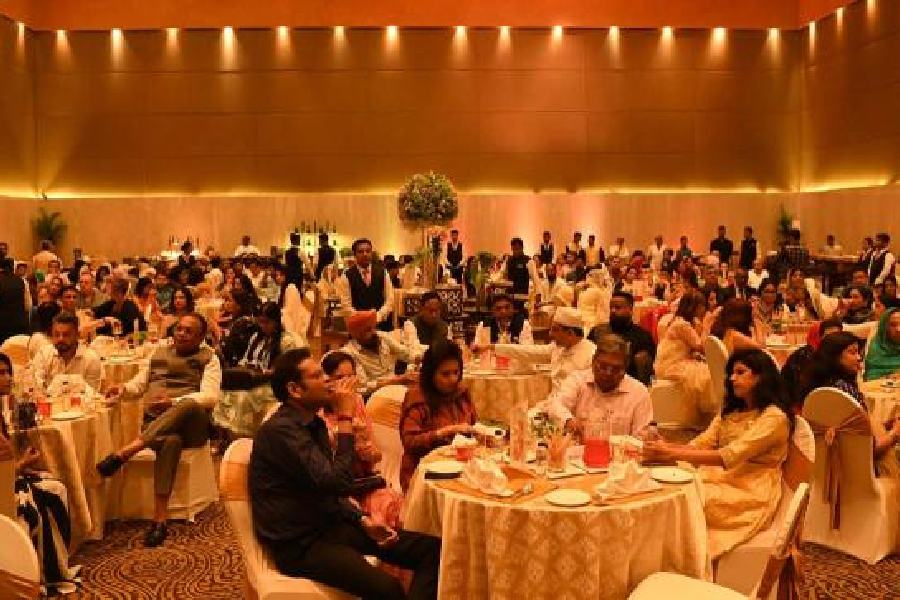A Bengali homemaker, a practising Hindu, fasted for the better part of Monday before breaking bread at an iftar in central Kolkata.
She was one of the many non-Muslims who fasted as a mark of solidarity with their Muslim fellow citizens in the month of Ramzan.
In a pocket in Howrah, Hindu women took the lead in chopping fresh fruits to prepare the iftar meal for Muslim neighbours. Often with iron blades that are used to cut fruits and vegetables during Lakshmi Puja at their homes.
At a Hazra auditorium, a Muslim college teacher and activist took part in a panel discussion on the Citizenship Amendment Act on Saturday evening. A Hindu man peeled oranges and washed fresh dates in the greenroom for the speaker to break her fast.
Snippets such as these in the run-up to Eid show how Bengal transcends boundaries when it comes to faith and festivals.
One such event, titled Iftar-E-Aman, saw people praying to different gods come together at the glittering ballroom of LaLiT Great Eastern hotel on Monday evening. Aman means peace.
“This is not just an interfaith iftar, this is my country,” Shabina Umar, who teaches in a south Kolkata college, said from the dais. Cheering her in the audience was Rupa Chatterjee Ray, a homemaker married to a bureaucrat.
Around 6pm, after the azaan (call to prayer), she took her first sip of water since the night before. Chatterjee Ray was one of the several non-Muslims to have fasted for the occasion.
Growing up, Chatterjee Ray was exposed to Muslim culture through a dear friend of her parents, a (now-retired) IPS officer.
“Every Ramzan, we attended the most wonderful iftar parties at uncle’s place. We gorged on the delectable spread made by aunty. The fried mutton and Nargis kofta were her signature dishes. The iftar parties now are like a flash into childhood for me. When I was invited to this specific one, I felt the call from within to truly experience the community ritual of fasting and then breaking bread together. As Bengalis, we are no strangers to nirjola uposh (fasting without drinking water), so it was hardly out of the ordinary for me,” she told this newspaper.
In the third week of March, more than 500 people had their iftar together in a neighbourhood in Howrah’s Shibpur. Many of the participants came from the Priyanath Manna Basti, where the majority of the residents are Muslims.
Arranging the food for them were Hindu women.
“Several women from Hindu families would join us in chopping fruits for the iftar spread. They would bring bnotis (iron blades) that were used to chop fruits and vegetables for bhog during Lakshmi Puja at their homes,” said Srabanti Bhattacherjee, a theatre artiste, activist and member of the Priyanath Manna Basti Community Kitchen, a labourers’ canteen that began during the lockdown.
Bhattacherjee sees this shared living as the only antidote to the marauding juggernaut of polarisation.
“When the forces of division and communal bigotry are coming at you with full force, you have to resist them with the full might of communal amity,” she said.
At Sujata Sadan in Hazra, a panel discussion preceded the screening of a film, Land of My Dreams, based on the 2019-20 protests against the Centre’s citizenship trident.
College teacher Nousheen Baba Khan was a speaker. She was on fast and the discussion was due just after iftar. Manas Bose, part of the organising team, had arranged for water and a plate of dates, oranges and other fruits for her. He peeled the oranges in the greenroom.
“Gestures like these make me feel assured that I am not alone,” Baba Khan, who shared a post on social media with Bose’s picture, told this newspaper.
Bose teaches mathematics at Rokeya, a learning centre that came up during the first Covid-induced lockdown to help children of unorganised workers in Patuli and surrounding areas off EM Bypass. The centre has continued to have a life of its own even after Covid, imparting “inclusive education” to its pupils.
A group of Rokeya students toured the Zakaria Street-Colootola areas on March 18. They went to the majestic Nakhoda mosque and tasted the iftar delicacies that the area is synonymous with during Ramzan.
“The trip gave them a glimpse into the chequered past and pluralistic character of Kolkata. It left a mark on the impressionable minds,” said Kasturi Basu, one of the founders of Rokeya.
The children were accompanied by two volunteers from Know Your Neighbour, a social initiative aimed at promoting interfaith dialogues and social harmony.
Imran Zaki, the organiser of the interfaith iftar on Monday, said increased interaction between people was the road to social harmony.
“With ignorance comes negativity,” he said.
